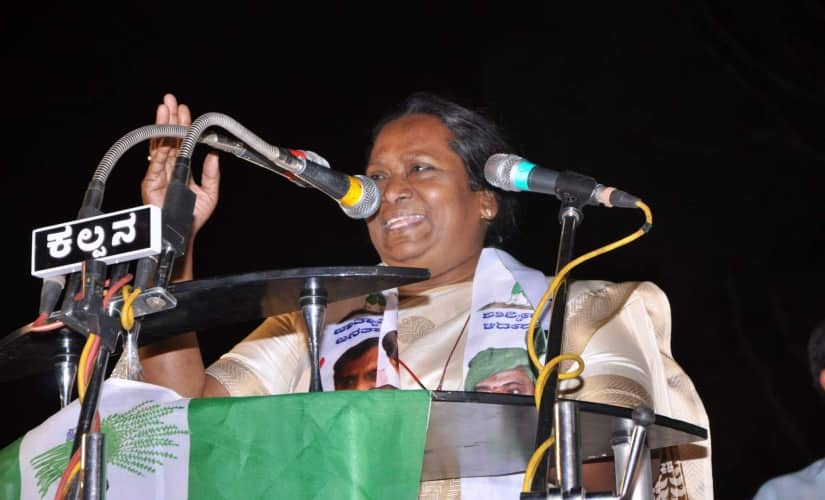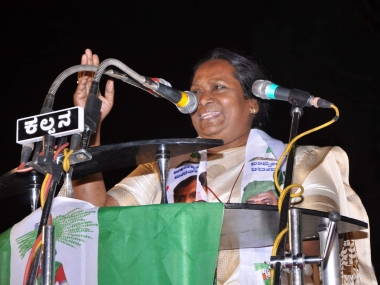If we look at our country’s politics, there has been no one from the scheduled castes who has become the Prime Minister of India till date, let alone a scheduled caste woman. Political engagement of Dalits is necessary, but more importantly, it has to include Dalit women leadership in political spaces. The panel on ‘ Dalit Women in Politics: Past, Present and Future ’— organised by The Blue Club, a collective for providing mentorship and support to women filmmakers, and All India Dalit Mahila Adhikar Manch (AIDMAM) — was put together with the above vision in mind. More than 60 Dalit women leaders from across India participated in the conference. Firstpost will be publishing some of the important speeches from this panel. This is the eighth of the series of speeches . *** Dr Ambedkar said, pull the chariot forward and if you can’t, don’t take it back. Leave it there. Others will take it forward. I will start with this phrase. Our life is full of struggles, full of feelings. I started the National Federation of Dalit women in 1994, many people here are witness to that. Since then, we have taken the issue of caste discrimination onto international platforms. Many Dalit women participated at the Beijing Conference of 1995 and gave remarkable inputs. They still are the linchpins in all our social justice movements. Usually, these opportunities are enjoyed by other women, they will call one Dalit woman who can talk in English as tokenistic representation. When I was at the conference, I said that women from the marginalised communities should talk about their issues. People with full stomach and accumulated wealth for generations need not talk about poverty. Those who are affected by it should talk about it. Similarly, violence against women. It affects all of us, all the women. The #MeToo movement was initiated by an oppressed Black woman from the United States. In India too, it was a Dalit woman who initiated it. Dalit women’s voices were strong in the #MeToo movement. It’s only the women from the margins who are capable of changing society. [caption id=“attachment_6249271” align=“alignnone” width=“825”]  Ruth Manorama. Image courtesy Facebook page/Ruth Manorama[/caption] Dalit politics is the reflection of Dalit reality. The Dalit struggle is never separate from the political movements of this country. If Dr BR Ambedkar did not chair the Constituent Assembly, no women here would have got the right to vote. It’s not only the Dalits who benefitted from Ambedkar’s Constitution but every woman and marginalised person in India owe it to him. If not for him, only the upper caste upper class elitist landowning capitalist men only would have got the right to vote. Ambedkar made sure dominant caste people with all the land, resource and privilege are not benefited asymmetrically, he made one vote for one citizen, “One man, One vote”. Therefore, Indian women never struggled for their right to vote like the other European and Scandinavian countries. Only because of Dr BR Ambedkar, we have a Constitution which clearly says, “There shall be no discrimination on the basis of class, caste, gender, sex and religion,” with the core values of Equality, Social justice and Fraternity. In the 1950s, women formed 4.4 percent of the parliament. Today it is just 11 percent, which is very much lesser than in 1950s when you compare its disproportionality with our population growth. Women are not allowed into the political fray because they are supposed to have no mind of their own and they lack capability. Male dominated political parties of this country do not want women in politics. They want us to stay inside the kitchen, taking care of our children. Even now with all talks about politics and governance they allow us only in municipality and panchayat levels and do not want us anywhere near Delhi. That is why the women’s reservation bill is being delayed. But one should look back and see that women participated in the freedom struggle, there were 15 women in our Constitution Committee – the very same Constitution that gave us our political structure today. One of them was Dhakshayini from Kerala, a Dalit woman. There were millions of women who participated in freedom struggles, throwing out the British. Their ultimate goal was freedom, women who gave away all their ornaments to raise funds for freedom struggles. Women who vowed never to marry until the country is independent, our freedom was attained with such sacredness. But today women have been sidelined, they think we do not have the capacity and capability. That is the destiny of Dalit women, all women. When women confer to stereotypes, they are easily accepted. This is the same in politics as well. Political parties choose women who confer to their standards of gender and they are retained as a form of tokenism of gender equality in the parliament. They are not given the chance to speak in political spaces like the parliament. If at all given the chance, it’s all scripted by the status quo of the party and hence very much against the women of this country. They want us to go back to old times, but can we do that? We know only two genders back then, male and female. Now we are talking about third genders, non-binary. We need to understand that political discussion among Dalit women and our participation in politics is essential for our emancipation. We want to be in places of decision making. We are assigned multiple roles all the time. Child rearing, taking care of the husband, house-keeping, cooking. If we are part of an organisation, we need to work twice harder than the men working with us. Multiple roles that we play inhibit us from stepping into politics. We are also made to believe that women cannot survive in politics because it’s very corrupted. There is a lack of confidence from women and lack of public support which stops women from achieving in politics. Women from social movements should get into politics. In 2014, 17 women went to meet Sonia Gandhi in Delhi as a part of the National Federation of Dalit Women (NFDW). We asked her to give us a list of women politicians in her party and ensure that there is equal representation of women. Her response to us was, “My men only don’t give me the list.” We lack financial support; we don’t get positions of power. This brings us to the crucial question — Who are the ones that can get into politics? Only if your dad or your granddad or your ancestors have been in politics, can you also venture in? Even women can easily get into politics through nepotism. Women politicians can enjoy power only because they inherited it through their family. If not, then it’s a wild path for women. Therefore, politics is a place where power is inherited. A woman with a strong ideological thought process cannot get into politics because there is targeted violence against her. There are threats of acid attacks. She is almost always called a prostitute and said that she slept her way to power, we have to face all the sexists’ comments. People in the women’s movement and women in social movements can never say that they are not into politics. You do not need to belong to a political party to be in politics. As an individual, if you are working on women’s issues, fighting justice and rights of women, working against caste atrocities, you are already a politician in the making. (Speech transcribed by Priyadharshini and Kanaga Varthan) Ruth Manorama is the 2006 recipient of ‘The Right Livelihood Award’. She contested in the 2014 General Elections from Bangalore (South)
We need to understand that political discussion among Dalit women and our participation in politics is essential for our emancipation.
Advertisement
End of Article


)

)
)
)
)
)
)
)
)



